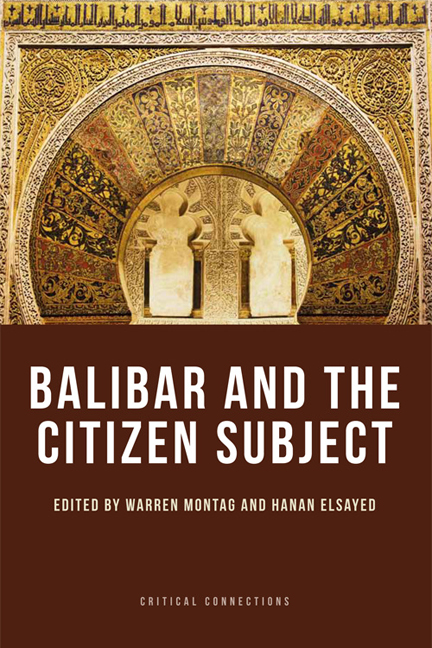Book contents
- Frontmatter
- Contents
- Introduction: Balibar and the Citizen Subject
- Part I Balibar Reading Schmitt Reading Hobbes: Equality or Similitude?
- Part II Transindividual/Universal
- 3 The “Other Scene” of Political Anthropology: Between Transindividuality and Equaliberty
- 4 Intersubjectivity or Transindividuality: The Leibniz– Spinoza Alternative
- 5 A Parallelism of Consciousness and Property: Balibar's Reading of Locke
- 6 Figures of Universalism: Notes on Philosophy and Politics in Etienne Balibar
- 7 Balibar and the Philosophy of Science: The Question of the “Epistemological Break”
- Part III Inequality, Violence and the Possibility of Citizenship
- Notes on Contributors
- Index
3 - The “Other Scene” of Political Anthropology: Between Transindividuality and Equaliberty
from Part II - Transindividual/Universal
Published online by Cambridge University Press: 10 January 2018
- Frontmatter
- Contents
- Introduction: Balibar and the Citizen Subject
- Part I Balibar Reading Schmitt Reading Hobbes: Equality or Similitude?
- Part II Transindividual/Universal
- 3 The “Other Scene” of Political Anthropology: Between Transindividuality and Equaliberty
- 4 Intersubjectivity or Transindividuality: The Leibniz– Spinoza Alternative
- 5 A Parallelism of Consciousness and Property: Balibar's Reading of Locke
- 6 Figures of Universalism: Notes on Philosophy and Politics in Etienne Balibar
- 7 Balibar and the Philosophy of Science: The Question of the “Epistemological Break”
- Part III Inequality, Violence and the Possibility of Citizenship
- Notes on Contributors
- Index
Summary
The political thought of Etienne Balibar is framed between transindividuality and equaliberty. These terms frame much of Balibar's writing on politics, citizenship, race and philosophy in recent decades yet they do not have the same status. One is borrowed, a citation from Gilbert Simondon, while the other is Balibar's neologism, a word that combines equality and liberty. The first is situated with respect to Balibar's investigations in the history of philosophy, constituting a tradition of Spinoza, Hegel and Marx, while the second is deployed in Balibar's investigations of the intersection of race, nation and class in contemporary politics. One term refers to a question of political anthropology, or even ontology, an articulation of the fundamental problems of individual and collective, while the other is framed between the relation between equality and liberty, rights and freedoms, in the history of political practice. The points of overlap are just as salient as their differences. Transindividuality and equaliberty challenge conventional, which is to say both philosophical and ideological, notions of the individual and society, collectivity and individuality. The point, however, is not that these terms are the same, referring to identical terms and questions, nor that they are rigorously distinct, referring to different fields of inquiry – specifically social ontology and politics – but that the differences and relations may itself be a way of articulating what are some of the most pressing questions in contemporary philosophy, not just the relation between the individual and collective, but also the relation between politics and economics, and ultimately the relation between ontology and politics. The relation between transindividuality and equaliberty defines not just a field of political questions on citizenship, civility, the nation and race, but defines a particular philosophical practice, a particular way of engaging in political problems.
Transindividuality chez Balibar
The term “transindividuality” is drawn from the work of Gilbert Simondon, most specifically the posthumously published L'individuation psychique et collective. As much as Balibar acknowledges this as the source of the term, his own development of the concept is drawn more from the work of Spinoza, or more specifically Spinoza as initially read by Alexandre Matheron in Individu et commauté chez Spinoza.
- Type
- Chapter
- Information
- Balibar and the Citizen Subject , pp. 111 - 131Publisher: Edinburgh University PressPrint publication year: 2017



